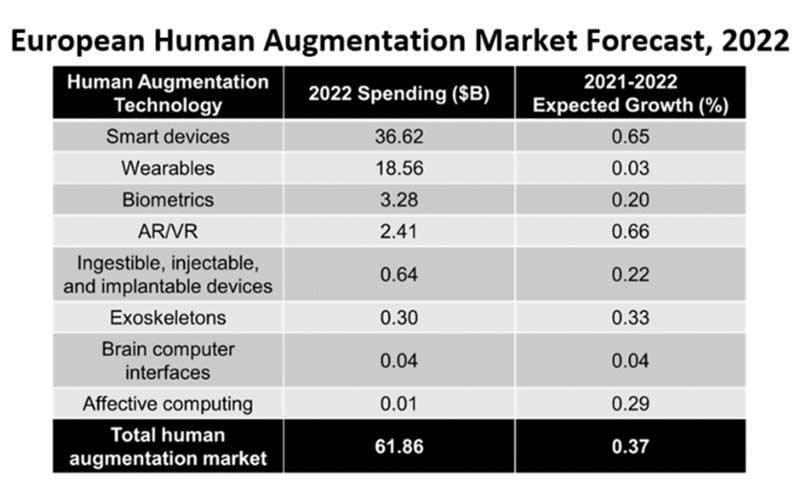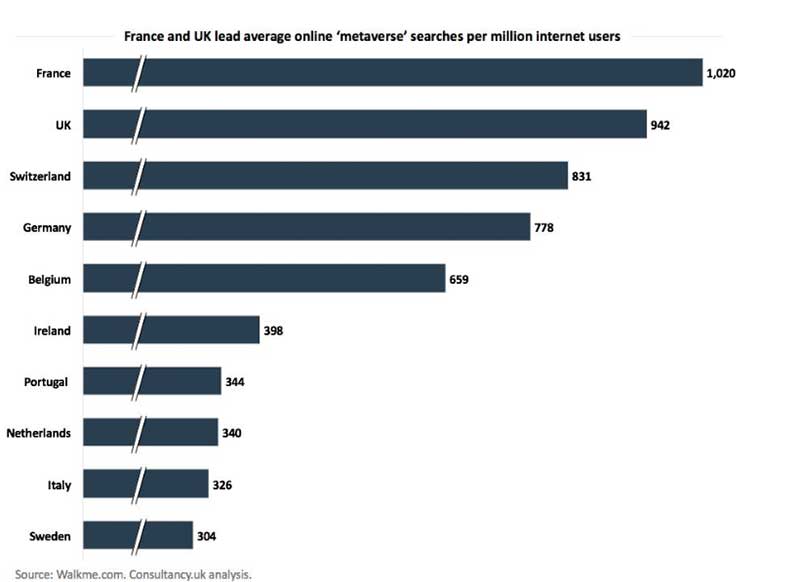The spending of European companies on human augmentation technology will exceed $100 billion by 2026, according to new forecasts. This growth will be fuelled by the rise of the metaverse, which is set to pave the way for a new frontier for emerging tech like AI, biometrics, smart devices and reality technology.
Data released by the International Data Corporation (IDC) highlights that the European Human Augmentation market, which refers to technologies like virtual reality, biometrics, smart wearables, exoskeletons, and any other effective augmentation tech, will attain a value of over $62 billion by the end of 2022, before surpassing $100 billion by 2026.
This significant rate of growth will be optimised by the development of the metaverse, which promises to deliver a level of interconnectivity throughout the web3 landscape that’s difficult to imagine with present-day limitations.

“As the work culture changes in Europe, many companies will accelerate their digital transformation efforts, and we will more frequently hear about human augmentation and its benefits,” said Andrea Minonne, research manager at IDC Europe.
“We live in an era when skill and staff shortages, supply chain disruptions, security concerns, and hybrid workspaces are part of our daily life. Human augmentation will be crucial to bridge these gaps and address industry needs, and European companies will use technology to unlock new skills and elevate existing ones, while also creating digital-based employee experiences.”
Europe is already seeing growth across a number of metaverse-facing industries, with the UK and France positioning themselves at the forefront of the emerging landscape. Metaverse studios like the Born Studios have opened up services to businesses around the continent to help build their own metaverse projects and human augmentation tech.
Furthermore, Meta confirmed in late 2021 that the company intended to hire 10,000 new employees in the European Union to work solely on the development of the metaverse.
“The metaverse has the potential to help unlock access to new creative, social, and economic opportunities. And Europeans will be shaping it right from the start,” Facebook noted in a blog post.
Human augmentation will be a central part of the metaverse, with the use of reality technology a particularly important tool in delivering the fledgling landscape to businesses and customers throughout Europe.
Not only has the forecasted sharp rise in business spending on augmentation acted as a key indicator of a continent that’s readying for the emergence of the metaverse – consumer curiosity and the EU’s analysis of regulatory frameworks also point to an integrated future.
Curiosity for the Metaverse Peaks in Major Western European Nations
Excitement for the metaverse is certainly not limited to European businesses alone, and consumers in populous western European nations like France, the UK, Germany, and Switzerland have led the way in generating online queries for the term ‘metaverse’.

In France, a nation that’s been quick to adopt emerging blockchain technologies like NFTs, curiosity for the metaverse has been greater than in other European nations, with 1,020 of every million internet users running a search for ‘metaverse’. Other nations like the UK, which has also expressed a willingness to be at the forefront of the development of blockchains that could potentially fuel industries like crypto, decentralised finance projects, and the metaverse, ranked highly.
The curiosity surrounding the metaverse had taken on a new level in late 2021 when Facebook announced that it would rebrand to Meta. Since then, many users have been busy imagining what a fully realised, developed metaverse would look like. This has led to many Google searches surrounding the subject – with recent data pointing to western Europe as a place bustling with consumer interest.
The European Union’s Regulatory Push
The European Union is not only aware of the scale of potential surrounding the metaverse, it also appears to be concerned about the regulatory ramifications of such a sprawling new digital landscape.
“The metaverse is here already. So, of course, we start analysing what will be the role of a regulator, what is the role for our legislature,” Margrethe Vestager, the EU’s antitrust chief, said at a recent event arranged by German newspaper publishers.
“Everything we do must be fact-based and based on the information that we can get. We need to understand it before we can decide what actions would be appropriate,” Vestager added.
The EU is undoubtedly wary of Meta’s significant interest in building into the metaverse due to the controversies surrounding Facebook’s collection and use of data. At present, companies can be fined as much as 10% of global turnover if found guilty of breaching the Union’s antitrust rules. However, given the interconnected nature of the metaverse, companies may be capable of collecting biometric data of users on an unprecedented scale – which is likely to be a key concern for many regulatory bodies.
The metaverse is set to become a major frontier for the next generation of the internet, web3. With European businesses and users alike ramping up their interest in this fresh burgeoning landscape, the onus will be on the EU and regulators to ensure that this brave new world is safe for everyone to use.
Disclaimer: This article contains sponsored marketing content. It is intended for promotional purposes and should not be considered as an endorsement or recommendation by our website. Readers are encouraged to conduct their own research and exercise their own judgment before making any decisions based on the information provided in this article.



































